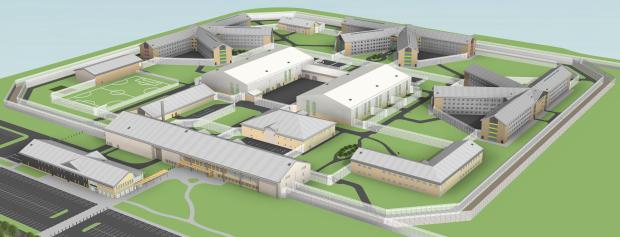Hundreds of inmates at a prison in Wales are still sharing cells – even though empty ones are available. The new ‘super prison’ HMP Berwyn in North Wales, and others, offered ‘near perfect conditions for an outbreak’, according to Plaid Cymru (as reported in the Daily Post). Liz Saville Roberts MP revealed that 2,847 prisoners share cells in prisons in Wales, with the highest number being in HMP Berwyn, with 1,100 prisoners sharing cells. Berwyn was built for 2,200 prisoners and currently has about 1,400 inmates.
‘Mega prisons like HMP Berwyn offer near perfect conditions for an outbreak and this Conservative Government seems to have done nothing to protect those that have to work there, as well as those housed in the facility. Forty five members of staff and 74 prisoners have already caught the virus – how many more must fall ill before the UK Government acts?’
Liz Saville Roberts MP
A prisoner at HMP Berwyn tested positive for COVID-19 in March, while data has shown that 45 members of staff and 74 prisoners in Wales had contracted the virus. Research published in April showed that although Wales only comprises 6% of the prison population in England and Wales, they have 25% of confirmed COVID-19 cases in prisons.
The UK Government announced in April that they would build single-occupancy cells across prisons in the UK to ‘limit the spread of infection and the number of deaths’, however the Ministry of Justice has not built any temporary single cells in Wales.
A spokesperson for the Prison Service said they had ‘already started to install some of the dozens of temporary cells in Welsh prisons’. The Ministry of Justice said that the temporary cells were at HMP Prescoed and no temporary cells at Berwyn and ‘in total’ 40 were ‘being built (construction already started)’.
Meanwhile, it was reported that only 55 prisoners have been released early under emergency COVID-19 measures out of the supposedly eligible 4,000. According to the Guardian, a justice minister Lucy Frazer told the Justice Select Committee that an additional 21 pregnant women had been released, out of the 70 eligible. 5 prisoners have been released on compassionate release.
At the start of April the government announced that 4,000 prisoners were eligible to be released early as they were within two months of their release date and had been risk-assessed. Andy Slaughter MP said that this was a ‘missed opportunity’.
Frazer said the advice from Public Health England was that to operate a safe prison system, there needed to be a reduction in the prison population by 5,000-5,500. At the start of the pandemic, there were approximately 83,000 people in prisons in England and Wales. There are currently about 80,000.
Public Health England has said that the spread of the virus in prisons has actually been slower than expected, largely due to the highly restrictive regime in place in most institutions. However, campaigners have warned that this is not a long-term solution and that there are potential consequences for prisoners’ mental health, as well as the risk of tension and conflict in the prisons themselves.
In Scotland, 43 prisoners have been released early, as reported in the Daily Record.
Collapse of the justice system?
Shadow Secretary of State for Justice David Lammy MP published an article in the New Statesman on 7th May 2020 in which he stated that COVID-19 cannot mean the collapse of the criminal justice system. The Tottenham MP argued that the difficulties facing the criminal Bar during the pandemic might become ‘insurmountable’, and that ‘victims of crimes, and the wrongly accused, will pay the highest price if justice cannot be served’.
The leading barristers’ chambers Garden Court North warned that it was ‘imperative’ that the ‘short to medium term consequences’ of the current crisis did not become ‘a means of dispensing with or compromising one of the bedrocks of our democratic process, the right to trial by jury for serious criminal offences’. ‘Once gone it will never be revived.’
The fact that chambers operate through ‘the public funding of self-employed practitioners, as opposed to the salaried remuneration of employees’ was ‘no justification for failing to provide sufficient financial support’ to ensure that the lawyers on whom the criminal justice system depends are able to survive.
‘The provision of bounce back loans simply increases the debt burden whilst failing to address the absence of income for the period of suspension of jury trials. Many at the more junior end of the profession will be unable to service that debt in the future, thereby exacerbating the reduction in criminal law practitioners, which we have witnessed in recent years. Without a cash injection, the Government risks the failure of the sector, a public service run by acknowledged key workers, in the short to medium term. In addition, the Government will need to commit the resources which will be necessary to tackle the back log in jury trials.’
Garden Court North
Sentencing
The Lord Chief Justice has said that the impact of custodial sentences is likely to be more severe during the coronavirus pandemic than it would otherwise be. In the lead judgment in R v Manning [2020] EWCA Crim 592 (30 April 2020), judgment here, the court stated that this was a factor which judges and magistrates should keep in mind when imposing sentences, as reported in the UK Human Rights Blog.
‘We would mention one other factor of relevance. We are hearing this Reference at the end of April 2020, when the nation remains in lock-down as a result of the Covid-19 emergency. The impact of that emergency on prisons is well-known. […] The current conditions in prisons represent a factor which can properly be taken into account in deciding whether to suspend a sentence. In accordance with established principles, any court will take into account the likely impact of a custodial sentence upon an offender and, where appropriate, upon others as well. Judges and magistrates can, therefore, and in our judgment should, keep in mind that the impact of a custodial sentence is likely to be heavier during the current emergency than it would otherwise be.’
Lord Burnett of Maldron







